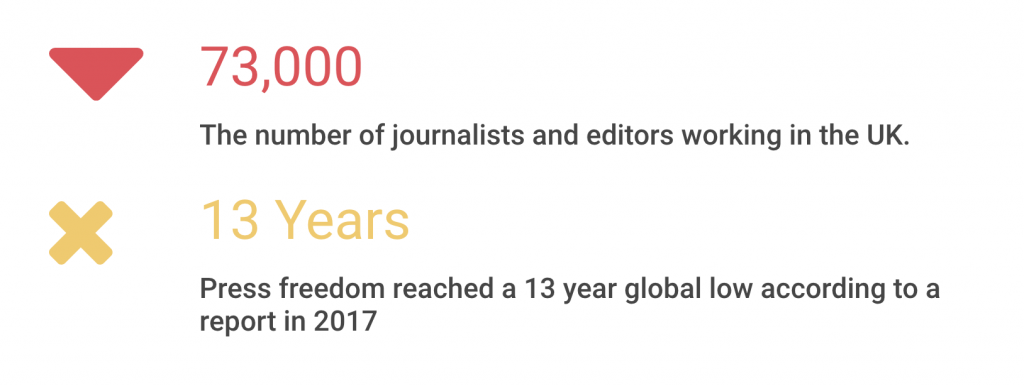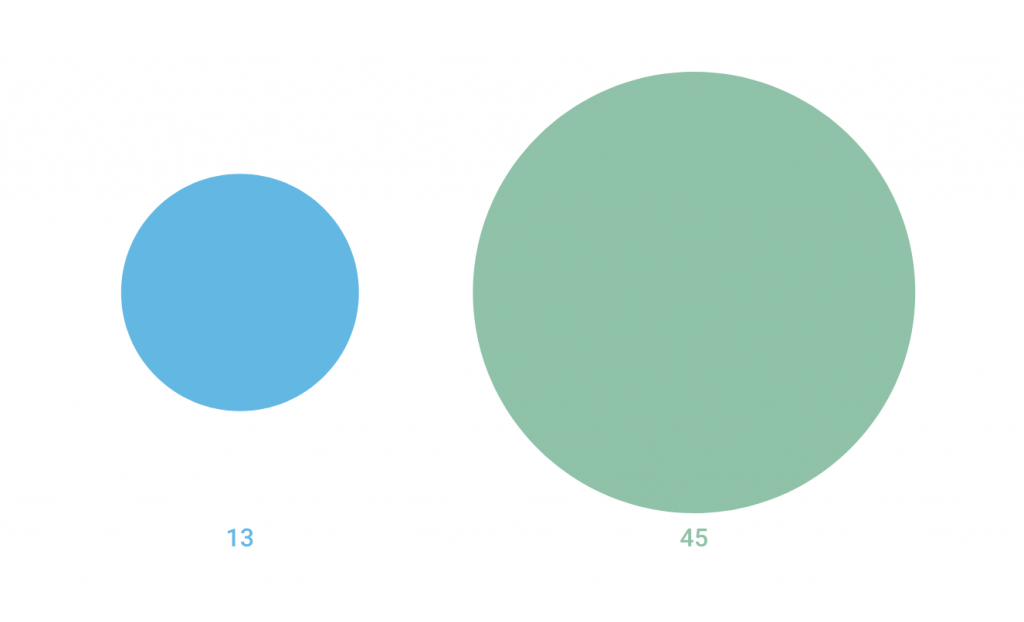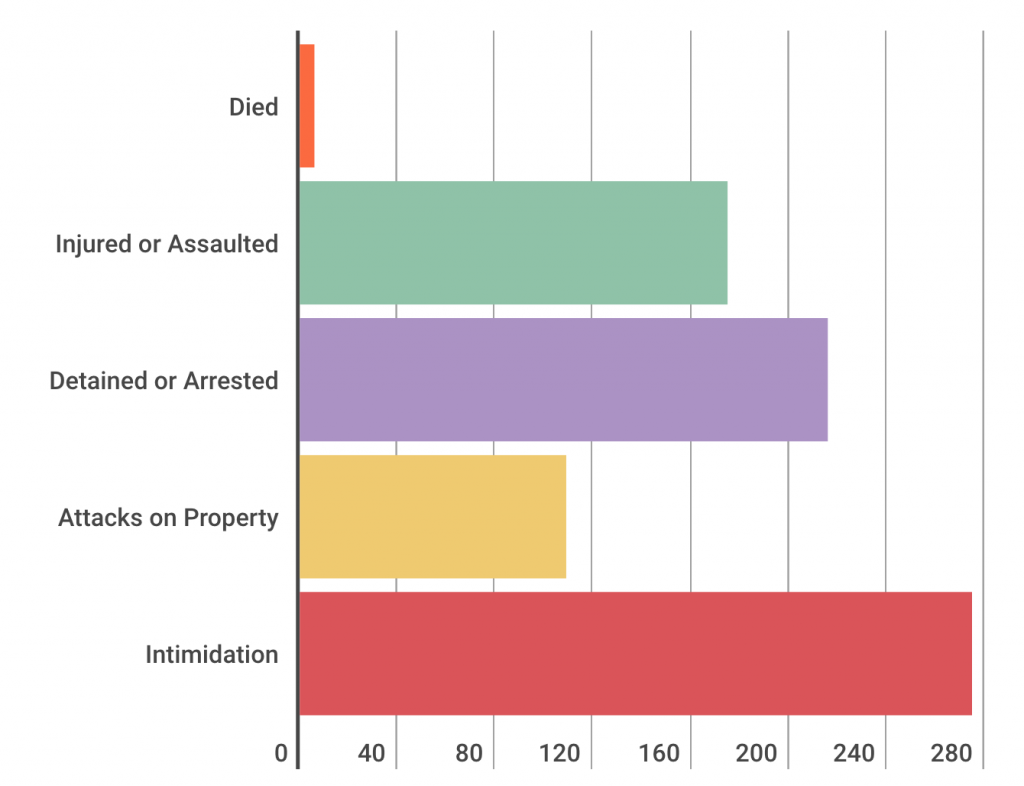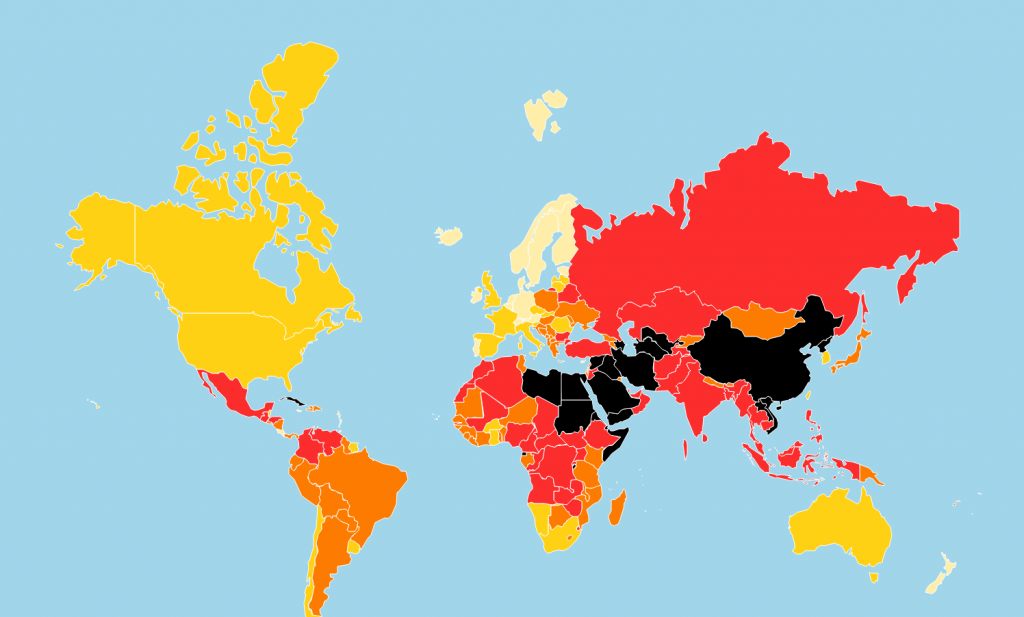Freedom of expression is one of our most valuable human rights, and it’s particularly vital to ensuring a free press.
Protected by Article 10 of the Human Rights Convention, which is part of UK law through the Human Rights Act, free expression allows journalists to report, investigate and hold power to account safely, without fear of legal or economic sanctions from governments.
There are times this can be curtailed legitimately, for example in the interests of national security or privacy, but for the most part, reporters should be free to, well, report. However, that’s not always the case.
This World Press Freedom Day we’ve taken a look at the worrying facts and figures surrounding journalists both here in the UK and around the world.
The Lowest Levels of Press Freedom in 13 Years

Journalism is good for democracy. It holds politicians to account and helps to spread information throughout the population. However, things aren’t entirely rosy. Here in the UK, just 73,000 people classed themselves as journalists or editors in 2017, down from 84,000 the year before.
Unprecedented threats to journalists and media outlets in major democracies.
Freedom of the Press 2017.
What’s more, a report found that global press freedom had reached its lowest point in thirteen years, with “unprecedented threats to journalists and media outlets in major democracies” and “new moves by authoritarian states to control the media, including beyond their borders”.
An update for 2018 found this was a worrying trend that continued to grow, citing factors such as Donald Trump’s antagonistic rhetoric. “As recently as five years ago, global pressure on the media did not appear to affect the United States or the established democracies of Europe in any significant way,” reads the report.
“Today, populist leaders constitute a major threat to free expression in these open societies. Ambitious politicians around the world are increasingly willing to dispense with the norms of behaviour that held their predecessors in check, in some cases blatantly undermining press freedom.”
Only 13% of the World’s Population Actually Has a Free Press

The same report also found that the majority of the world’s population don’t actually live somewhere where the press is afforded basic protections and is regarded as free. In fact, just thirteen percent of us have this luxury globally.
Almost half of us, a massive forty-five per cent, live in countries where the media environment is considered to be categorically ‘not free’.
In many countries, governments exert their influence over public media outlets and, in some more authoritarian states, will go so far as to extend restrictions to online platforms. Social unrest is commonly cited as justification, but shut-down of communication will often occur at crucial political moments, such as before an election
Six Journalists Died in 2017 – And 175 Were Injured

Overall, six journalists lost their lives while reporting in Europe during the last year, according to research by Index on Censorship, including Swedish journalist Kim Wall, who disappeared after taking a trip on a submarine with a Danish inventor. Her dismembered body was discovered about a week later.
275 counts of intimidation, 37 death threat and more than 200 journalists arrested or detained
Index on Censorship
The group also found evidence of 275 counts of intimidation, including psychological abuse, sexual harassment, trolling, cyberbullying and defamation. Media workers received a total of 37 death threats throughout Europe, while more than 200 were detained or arrested.
How Does the UK Compare?

Image Credit: Reporters Without Borders
For the second year running the UK has come in at 40th in the Reporters Without Borders World Press Freedom Index, consistently ranking as one of the worst Western-European countries.
Looking at a range of criteria including media independence, transparency and abuse, Norway, Sweden and the Netherlands came out top, with Turkmenistan, Eritrea, and North Korea rounding off the bottom of the list.
However, while we’re clearly way ahead of some countries, the index suggests a worrying “tipping point” in the state of media freedom, with democracies steadily falling in ranking.
Researchers blamed the UK’s “heavy-handed” approach of towards the press for our low score, often justified for reasons of “national security” and including things like extreme surveillance legislation, insufficient protection of whistleblowers and journalists, and political parties restricting media access to major events.







